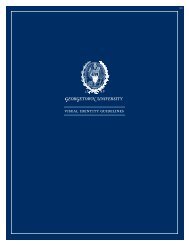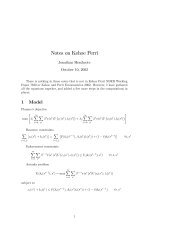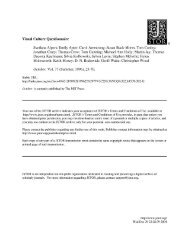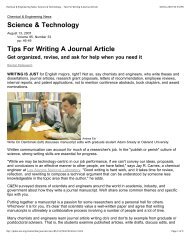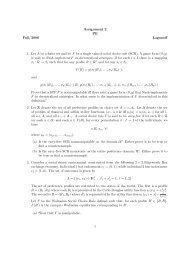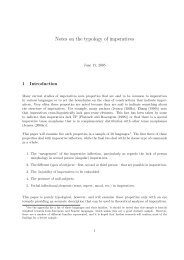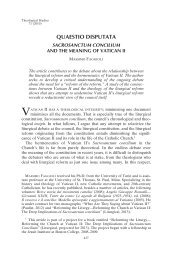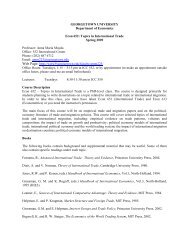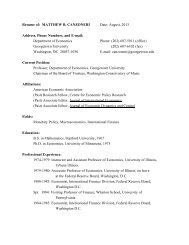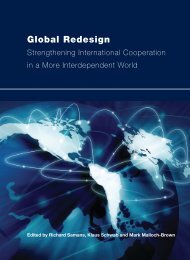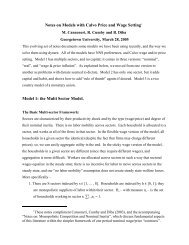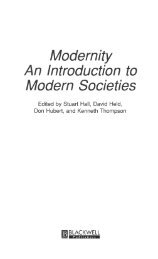Islam and the West: Annual Report on the State of Dialogue
Islam and the West: Annual Report on the State of Dialogue
Islam and the West: Annual Report on the State of Dialogue
Create successful ePaper yourself
Turn your PDF publications into a flip-book with our unique Google optimized e-Paper software.
<str<strong>on</strong>g>Islam</str<strong>on</strong>g> <str<strong>on</strong>g>and</str<strong>on</strong>g> <str<strong>on</strong>g>the</str<strong>on</strong>g> <str<strong>on</strong>g>West</str<strong>on</strong>g>: <str<strong>on</strong>g>Annual</str<strong>on</strong>g> <str<strong>on</strong>g>Report</str<strong>on</strong>g> <strong>on</strong> <str<strong>on</strong>g>the</str<strong>on</strong>g> <strong>State</strong> <strong>of</strong> <strong>Dialogue</strong><br />
94<br />
Ec<strong>on</strong>omic <str<strong>on</strong>g>and</str<strong>on</strong>g> Social Development<br />
housing, job training, <str<strong>on</strong>g>and</str<strong>on</strong>g> crime. It particularly<br />
focused <strong>on</strong> addressing <str<strong>on</strong>g>the</str<strong>on</strong>g> influx <strong>of</strong> migrant<br />
labour from Muslim majority countries,<br />
including Turkey <str<strong>on</strong>g>and</str<strong>on</strong>g> Morocco. Housing, too,<br />
is emerging as a critical development issue at<br />
<str<strong>on</strong>g>the</str<strong>on</strong>g> local level open to interfaith approaches.<br />
Since 2002, Habitat for Humanity Leban<strong>on</strong><br />
has assisted displaced Lebanese families in<br />
40 mixed Christian <str<strong>on</strong>g>and</str<strong>on</strong>g> Muslim communities in<br />
<str<strong>on</strong>g>the</str<strong>on</strong>g> sou<str<strong>on</strong>g>the</str<strong>on</strong>g>rn part <strong>of</strong> <str<strong>on</strong>g>the</str<strong>on</strong>g> country, <str<strong>on</strong>g>and</str<strong>on</strong>g> similar<br />
approaches are underway in Egypt.<br />
One <strong>of</strong> <str<strong>on</strong>g>the</str<strong>on</strong>g> most far ranging recent efforts to<br />
link Muslim identity with social <str<strong>on</strong>g>and</str<strong>on</strong>g> ec<strong>on</strong>omic<br />
welfare is India’s Sachar Commissi<strong>on</strong>, which<br />
reported to <str<strong>on</strong>g>the</str<strong>on</strong>g> prime minister in November<br />
2006. This commissi<strong>on</strong> report focused <strong>on</strong><br />
India’s Muslim community which, with more<br />
than 150 milli<strong>on</strong> citizens, is am<strong>on</strong>g <str<strong>on</strong>g>the</str<strong>on</strong>g> world’s<br />
largest. The commissi<strong>on</strong> focused <strong>on</strong> virtually<br />
all aspects <strong>of</strong> life ranging from water to nutriti<strong>on</strong><br />
to entrepreneurship to job prospects. It<br />
documented that, “while <str<strong>on</strong>g>the</str<strong>on</strong>g>re is c<strong>on</strong>siderable<br />
variati<strong>on</strong> in <str<strong>on</strong>g>the</str<strong>on</strong>g> c<strong>on</strong>diti<strong>on</strong>s <strong>of</strong> Muslims across<br />
states, <str<strong>on</strong>g>the</str<strong>on</strong>g> community exhibits deficits <str<strong>on</strong>g>and</str<strong>on</strong>g><br />
deprivati<strong>on</strong> in practically all dimensi<strong>on</strong>s <strong>of</strong><br />
development.”<br />
The Sachar Commissi<strong>on</strong>’s work involved<br />
numerous c<strong>on</strong>sultati<strong>on</strong>s <str<strong>on</strong>g>and</str<strong>on</strong>g> surveys <str<strong>on</strong>g>and</str<strong>on</strong>g> its<br />
recommendati<strong>on</strong>s are an object <strong>of</strong> intensive<br />
dialogue throughout India. Although not<br />
without criticism from some elements <strong>of</strong> <str<strong>on</strong>g>the</str<strong>on</strong>g><br />
Muslim minority leadership in <str<strong>on</strong>g>the</str<strong>on</strong>g> nati<strong>on</strong>, <str<strong>on</strong>g>the</str<strong>on</strong>g><br />
Sachar Commissi<strong>on</strong>’s extensive analysis as a<br />
basis for its recommendati<strong>on</strong>s st<str<strong>on</strong>g>and</str<strong>on</strong>g>s as a<br />
model am<strong>on</strong>g such efforts. In stressing <str<strong>on</strong>g>the</str<strong>on</strong>g><br />
importance <strong>of</strong> underst<str<strong>on</strong>g>and</str<strong>on</strong>g>ing <str<strong>on</strong>g>the</str<strong>on</strong>g> data <str<strong>on</strong>g>and</str<strong>on</strong>g><br />
<strong>of</strong>ten harsh realities facing <str<strong>on</strong>g>the</str<strong>on</strong>g> Muslim<br />
community, Indian Prime Minister Manmohan<br />
Singh argued, “<strong>on</strong>e cannot wish away<br />
differences merely by refusing to measure<br />
<str<strong>on</strong>g>the</str<strong>on</strong>g>m.”<br />
Efforts to address <str<strong>on</strong>g>the</str<strong>on</strong>g> HIV/AIDS p<str<strong>on</strong>g>and</str<strong>on</strong>g>emic<br />
illustrate how both partnerships <str<strong>on</strong>g>and</str<strong>on</strong>g> dialogue<br />
are taking new forms. Of particular interest are<br />
three initiatives. The first is <str<strong>on</strong>g>the</str<strong>on</strong>g> well-documented<br />
role <strong>of</strong> interfaith approaches to addressing <str<strong>on</strong>g>the</str<strong>on</strong>g><br />
HIV/AIDS p<str<strong>on</strong>g>and</str<strong>on</strong>g>emic in Senegal <str<strong>on</strong>g>and</str<strong>on</strong>g> Ug<str<strong>on</strong>g>and</str<strong>on</strong>g>a –<br />
efforts that could not have succeeded without<br />
<str<strong>on</strong>g>the</str<strong>on</strong>g> joint engagement <strong>of</strong> political <str<strong>on</strong>g>and</str<strong>on</strong>g> religious<br />
leaders, including prominent Muslims. The<br />
sec<strong>on</strong>d <str<strong>on</strong>g>and</str<strong>on</strong>g> third are more recent efforts that<br />
focus internati<strong>on</strong>ally <strong>on</strong> <str<strong>on</strong>g>the</str<strong>on</strong>g> Muslim world. The<br />
UNDP-led c<strong>on</strong>ference in Cairo in 2006 was<br />
seen as a breakthrough in dialogue <strong>on</strong> <str<strong>on</strong>g>the</str<strong>on</strong>g><br />
topic. The c<strong>on</strong>ference, marking <str<strong>on</strong>g>the</str<strong>on</strong>g> creati<strong>on</strong> <strong>of</strong><br />
<str<strong>on</strong>g>the</str<strong>on</strong>g> First Network <strong>of</strong> Arab Religious Leaders<br />
Resp<strong>on</strong>ding to AIDS, includedrepresentatives<br />
from more than 20 Arab countries bridging <str<strong>on</strong>g>the</str<strong>on</strong>g><br />
religious divide. <str<strong>on</strong>g>Islam</str<strong>on</strong>g>ic Relief organized a<br />
meeting <strong>on</strong> <str<strong>on</strong>g>Islam</str<strong>on</strong>g> <str<strong>on</strong>g>and</str<strong>on</strong>g> AIDS in South Africa in<br />
November 2007, marked by open discussi<strong>on</strong><br />
about <str<strong>on</strong>g>the</str<strong>on</strong>g> key issues. These two events, <str<strong>on</strong>g>and</str<strong>on</strong>g><br />
o<str<strong>on</strong>g>the</str<strong>on</strong>g>rs like <str<strong>on</strong>g>the</str<strong>on</strong>g>m, dem<strong>on</strong>strate a greater<br />
willingness to address stigma, <str<strong>on</strong>g>the</str<strong>on</strong>g> role <strong>of</strong><br />
c<strong>on</strong>doms <str<strong>on</strong>g>and</str<strong>on</strong>g> <str<strong>on</strong>g>the</str<strong>on</strong>g> social c<strong>on</strong>sequences <strong>of</strong><br />
HIV/AIDS in a forthright fashi<strong>on</strong> – a new<br />
development in most Muslim majority<br />
countries, with <str<strong>on</strong>g>the</str<strong>on</strong>g> excepti<strong>on</strong> <strong>of</strong> Iran, which<br />
has most openly addressed <str<strong>on</strong>g>the</str<strong>on</strong>g>se issues.<br />
Migrati<strong>on</strong> <str<strong>on</strong>g>and</str<strong>on</strong>g> <str<strong>on</strong>g>the</str<strong>on</strong>g> integrati<strong>on</strong> <strong>of</strong> migrant<br />
communities have emerged as critical issues<br />
at <str<strong>on</strong>g>the</str<strong>on</strong>g> intersecti<strong>on</strong> <strong>of</strong> religi<strong>on</strong>, culture, <str<strong>on</strong>g>and</str<strong>on</strong>g><br />
ec<strong>on</strong>omic <str<strong>on</strong>g>and</str<strong>on</strong>g> social development. Migrati<strong>on</strong><br />
can be in some circumstances a positive facet<br />
<strong>of</strong> globalizati<strong>on</strong>, as people move freely to seek<br />
new opportunities, but its manifold dark sides<br />
involve pain, frustrati<strong>on</strong> <str<strong>on</strong>g>and</str<strong>on</strong>g> sometimes<br />
desperati<strong>on</strong>. Policies that affect migrati<strong>on</strong> are<br />
<strong>on</strong> <str<strong>on</strong>g>the</str<strong>on</strong>g> dialogue agenda in many countries,<br />
notably <str<strong>on</strong>g>the</str<strong>on</strong>g> United <strong>State</strong>s <str<strong>on</strong>g>and</str<strong>on</strong>g> Europe.<br />
The ec<strong>on</strong>omic impact <strong>of</strong> migrati<strong>on</strong> has been<br />
<str<strong>on</strong>g>the</str<strong>on</strong>g> subject <strong>of</strong> a l<strong>on</strong>g series <strong>of</strong> meetings,



